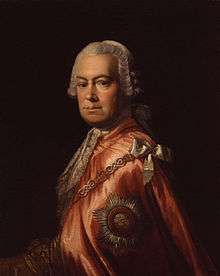Andrew Mitchell (diplomat)

Sir Andrew Mitchell (1708–1771) was a British diplomat noted for his service as envoy to the court of Frederick the Great during the Seven Years' War.
Early Career and Interests
Mitchell was the son of a minister who opted for a career in the law. His profession and intellectual interests took him frequently abroad, and in 1735 he formed a close friendship with Montesquieu in Paris. He took up a broad spectrum of intellectual pursuits that encompassed ancient and modern history, art, literature, and moral philosophy;[1] in 1736 he was elected a Fellow of the Royal Society .[2]
He was elected at the 1747 general election as the Member of Parliament (MP) for Aberdeenshire,[3] and held the seat until the 1754 general election.[4] He was elected as MP for Elgin Burghs at a by-election in January 1755,[5] and held that seat until his death in 1771.[6]
Envoy to Prussia
In May 1756, Mitchell arrived in Berlin, and was enthusiastically received by Frederick. Prior to this, antagonism had steadily been building between France and England over shipping and territory rights, and the British king, concerned with the exposure of his Hanoverian territories should war arise, wished to draw closer to Prussia. It was Mitchell's task to negotiate the Alliance and allay Frederick's fears of an Austro-Russian counter-alliance. Frederick, who resented the broken promises and secret diplomacy of the French court during the Silesian Wars, was amenable, and England remained his only steady ally throughout the Seven Years' War.
Mitchell stayed with Frederick, recording his observations of the king at war in his journals, until his recall in 1764. He returned to Berlin two years later, having been knighted in the interim, and remained until his death in 1771. Though the relationship between Mitchell and Frederick had suffered from Frederick's dissatisfaction with English policy at the end of the war and Mitchell's disenchantment with Frederick's "impatience of contradiction",[7] Frederick wrote in tribute that, "His talents and character had wholly gained my esteem and he retained it to the end of his days." Frederick wept openly at Mitchell's funeral procession.[8]
Writings
- Memoirs and Papers of Sir Andrew Mitchell
References
- ↑ Aspray, Robert (1986). Frederick the Great: The Magnificent Enigma. New York: Ticknor and Fields. p. 417. ISBN 0-89919-352-8.
- ↑ ‘Mitchell, Sir Andrew’, Library and Archive catalogue of the Royal Society.
- ↑ Stooks Smith, Henry. (1973) [1844–1850]. Craig, F. W. S., ed. The Parliaments of England (2nd ed.). Chichester: Parliamentary Research Services. p. 615. ISBN 0-900178-13-2.
- ↑ Leigh Rayment's Historical List of MPs – Constituencies beginning with "A" (part 1)
- ↑ Stooks Smith, page 642
- ↑ Leigh Rayment's Historical List of MPs – Constituencies beginning with "E" (part 1)
- ↑ MacDonogh, Giles (2001). Frederick the Great: A Deed in Life and Letters. New York: St. Martin's Griffin. p. 344. ISBN 0-312-27266-9.
- ↑ Aspray, 575.
| Parliament of Great Britain | ||
|---|---|---|
| Preceded by Sir Arthur Forbes, Bt |
Member of Parliament for Aberdeenshire 1747–1754 |
Succeeded by Lord Adam Gordon |
| Preceded by William Grant |
Member of Parliament for Elgin Burghs 1755–1771 |
Succeeded by Thomas Lockhart |